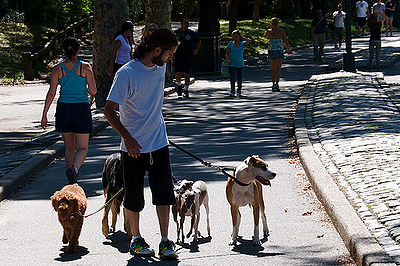Have you ever met someone to whom you took an immediate dislike? I know I have. Perhaps it’s just something we sense about the other person that raises our hackles. It may happen, at a later date, that we discover we were wrong and become friends. But the same may not be true for our dogs although we experience very similar emotions.
Just as we have with other people, our dogs may sense something about another dog that upsets or angers them. Of course dogs express their dislike differently. They growl, bark, snap and sometimes even attack the other dog. Very often, no matter how hard we try, these dogs can never be friends.
When any type of aggression occurs with another dog just walking by never to be seen again, there’s no problem. But when this happens with a neighbor’s or friend’s dog, things can become very difficult. One solution with a neighbor, is to come to an agreement not to let the dogs out at the same time. As for friends, you may have to meet without the dogs.
One of my friends tried to introduce a third dog into her pack of two. The younger of the two accepted the newcomer, but the older one did not. After many trials and dangerous close encounters for my friend and the dogs, she had to re-home the newcomer. My friend’s solution turned out to be the best for everyone.
There are instances when there is a dominant dog in the pack. As long as the other members of the group respect him/her, problems are usually avoided.
My beloved angel, Quanah, a GSD, was the dominant force in my pack of three. When I introduced my last rescue to the other two, everything was fine. They played together and seemed to get on well. However Quanah did not like when the third member, Cookie, walked past her in the house and she would sometimes snap. Cookie bowed to Quanah’s wishes and although at times I had to walk Cookie past Quanah, aggression was averted and they were good friends otherwise.
The best way to deal with this situation is to consult your veterinarian, dog trainer and/or an animal behaviorist. Your vet may be able to prescribe medication to help with the situation. However the problem may not be able to be resolved. If you find that you do have to re-home a dog, please choose the proper environment for the dog.


